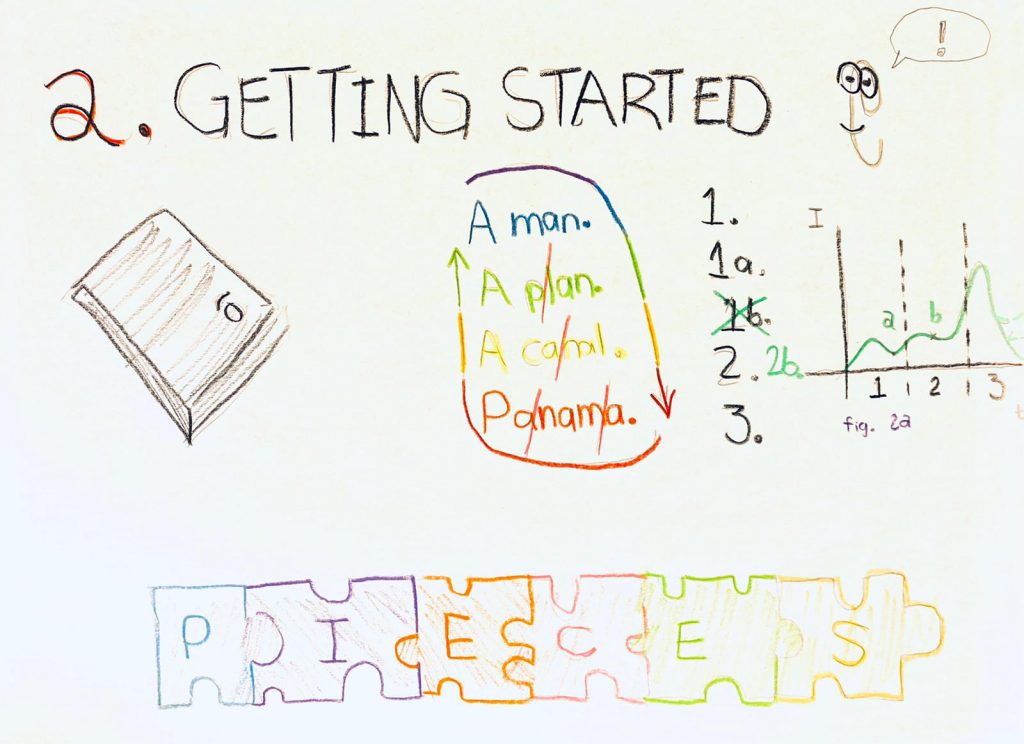“I should write a book about it”
A primer on self-publishing
By Orlando Torres | 29 October 2020
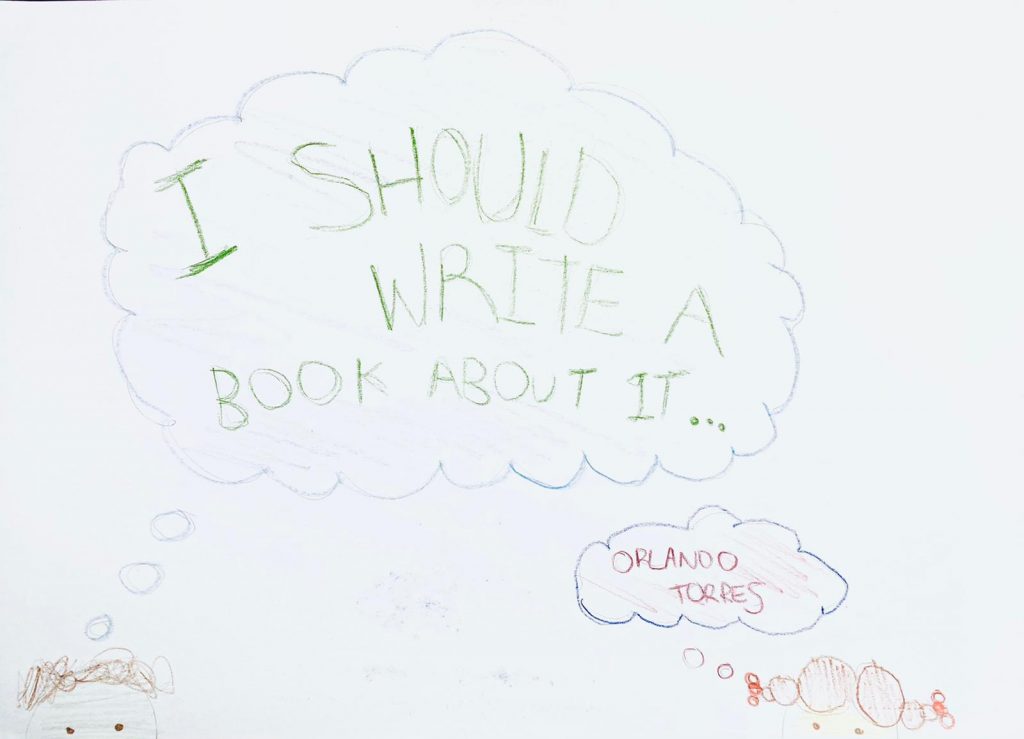
As I noted in the introduction to my talk, one of the primordial tasks of Men (capital M) is to have a child, plant a tree, and write a book. The first two may seem trivial (provided that as a Man (capital M) you do not have a problem talking with the ladies (or in turn, are able to overcome your insecurities by juxtaposing increased wealth due to preventable circumstances or late 40s desperation to find a partner), but difficulties arise on the last part. Every human being on earth has worthwhile stories to share: If you have ever spent some time with elderly people, they are typically in the mood to share everything and everywhere they were, had visited and experienced. Nonetheless, few people can do it in a way that is both compelling and attractive to a general audience, or in such a way that the stories go beyond “I did X. It was fun.“, without proper context and content that makes for an experience that one wants to spend a few weeks on a train immersing in, as have done the literary greats of the past.
Current conditions allow for pretty much any person to publish whatever they have in mind (also a double-edged sword for current events around the world), so it is now easier than ever in human history to gather stories, put some mental glue on them, and expose them to the planet.
…
But how?
— You may ask.Well, I will talk about 3 things to go from zero to hero, or more specifically: From scraps to… fully functioning mecha robot? Eh, maybe. Maybe not. We will figure it out.
1. Inspiration
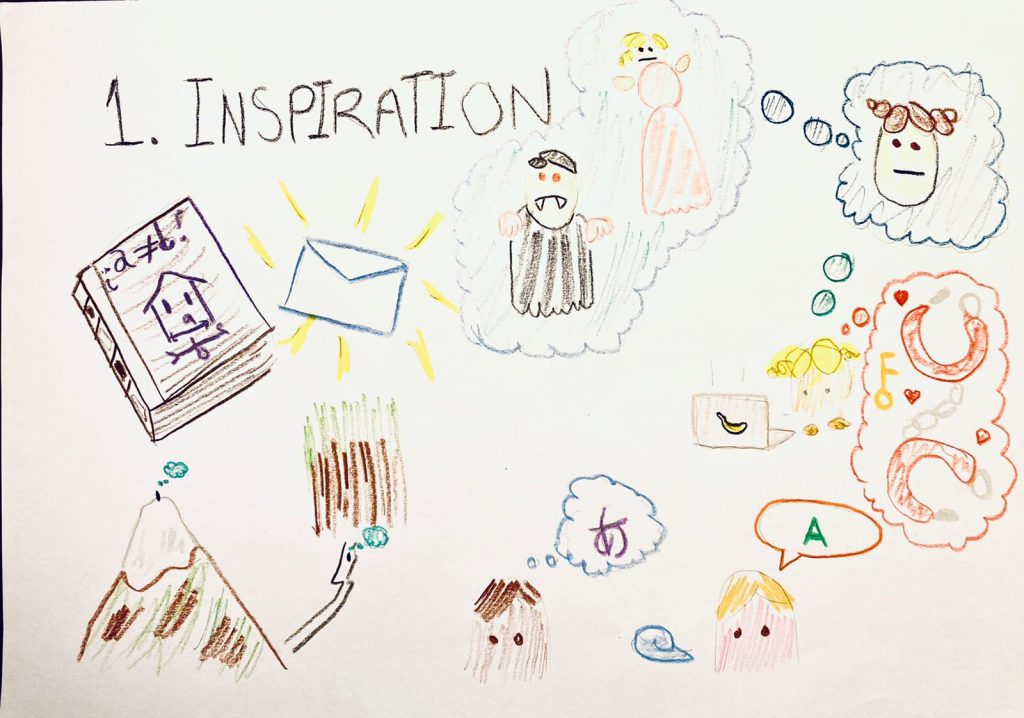
Inspiration comes in all different packages and forms: Life experience, our environments, our own minds. For many, personal experience would be the first source of inspiration, as those who have ever spent a long night waiting for a train may be able to disseminate, as you can find the weirdest, most inexplicable activities going on in an apparently eventless location. What happens in an empty train station at night? Well. Plenty. When I arrived in Germany in 2014, I went to a concert of the band Jaga Jazzist to Hafen 2, close to Frankfurt. It was a concert I wanted to see for the longest time, and I had a great deal of fun. I even caught a shirt the band drummer threw that I still have to this day! Unfortunately, I arrived 3 minutes too late to the train station, and I could not catch the last train back to Karlsruhe. Bad luck. I browsed the available tickets and I noticed that the prices were prohibitively high for a Mexican student with no income (I got a HiWi job later, worry not… If you are not a German person, a HiWi is an assistant researcher position in German universities that provides some income in exchange for menial research tasks), so I browsed the web for tickets… and voilá! Found bus tickets… at 3 AM. I had 3 hours to spare, so I walked around, skipping the bums in the train station when possible, as they were incredibly eager to talk to me (or maybe get a coin or two in return).
Interesting story, right? Well, you can read all about it in my next book (sly plug right there!).
Ahem. Other sources of inspiration are, of course, our environment or mental world. Stephenie Meyer, for example, drew inspiration from writers like Jane Austen in the writing of her “Twilight” series, and even though she gets a lot of criticism for writing Young Adult (YA) books… I mean. She does get paid for it at the end of the day, right? And she seems to enjoy it. So kudos to her for finding a niche audience… which has some overlap with audiences of another author, E.L. James, who decided to write books in the same universe (a practice well-known on the Internet as fan fiction or fanfic, for short), and then some “filing around the edges” later, scrapped the names, called the main man “Mr. Grey” and created her own niche in the series “50 Shades of Grey”, a book about light spanking and rich men and young students. I am not too sure about that. I only watched the movie with a girlfriend back in the day.
To that extent, inspiration can come from all over the place, and putting it into something alive and new, takes some effort, but probably the most difficult part is…
2. Getting started
Indeed. Getting started is probably among the toughest things to do to start a book. Like, “Where do I begin?“ comes to mind at first, when one has never in their life written a single word (other than maybe school assignments and the never missing poetic piece for a lost girlfriend in one’s teenage years… ah, dysphoria. We meet all the time, old friend.
As I was saying, a good way to start writing a book is to create a plan:
- What do I want to say?
- In which order?
- What am I trying to transmit?
In my case, I started writing books because, as a young man, I wanted to be a writer. Nonetheless, being a writer in Mexico is not exactly the most profitable enterprise one can take, so I scrapped the idea, studied something else in the STEM field (which provides a much better social mobility, especially in Mexico), and left the ideas on the back burner for a while. I never quite stopped writing though. I have been involved in more commercial-type writing (I started a blog in 2008 with some friends, and I also wrote a review or two when I was younger for music events), but still I had some liberty to write to my heart’s desire, although it never quite was my “bread making” activity. The book I wrote started as some scattered notes in a notebook and some notes in the computer. From there, the story grew into a more “book-like” concept. I did tell a lot of people in my social circles that “I was writing something”, but I think the key part was that I took it seriously enough when I actually found out that publishing is quite easy (albeit costs some money). The incentive of having an actual, physical book made me feel like writing a book was achievable, so I think the driving force was mostly that it was possible (without the publisher as a middle man) to create art under my own rules, and thus I ended up building the whole book with my own toolset – I write using a scientific typesetting software called LaTeX (no relation to E.L. James, pronunciation is actually contentious but I will go with the german pronunciation as Lah-TeJJJJJJJ, hard J).
Additionally, I had some ideas on doing “non-linear writing” which, for some, does not really work, as it takes some additional story building.
Nonetheless, a very quick recapitulation of story arcs:
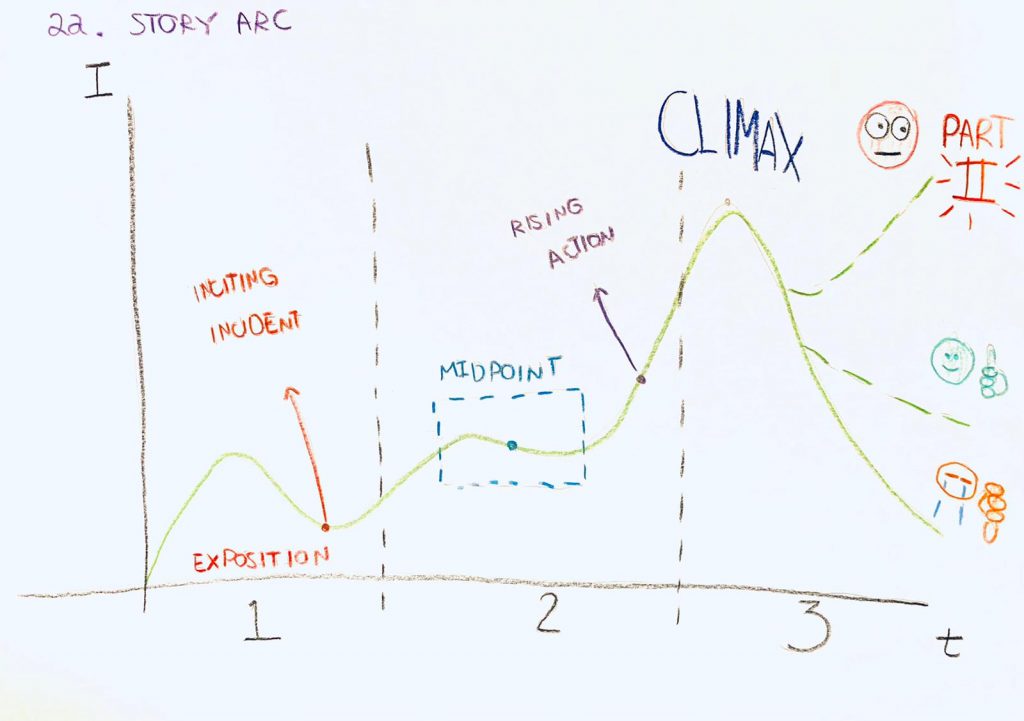
During exposition, the world in which the book is taking place is built: “Who is Bilbo Baggins?” for example, is a question that comes up often in The Lord of the Rings and, along very extraneous descriptions of trees and mulch, J.R.R. Tolkien puts the reader in the actual world where everything takes place. At some point, there is an inciting incident that rolls the ball and gets the main part of the story running: Elle Woods in Legally Blonde, for example, has the idea to become a lawyer because her partner thinks she is not “smart enough” and leaves her, breaking her heart and pushing her over the edge to show the world (and that horrible ex of hers) that she is worth it. The story builds up towards the midpoint, where stakes are heightened and the story develops further. In Aladdin, this is when the princess is not exactly sure that Aladdin is who he says he is, and he shows (through might and a flying carpet) that he is a good guy and he will show her the world. But then, the rising action comes into play, as in Jumanji, when the hunter is getting really close to the group, and Alan and the group start getting increasingly wacky situations, like the floor becoming moving sands, thus locking the action of the group and increasing the stress. The story then reaches the climax when all stakes are at the peak. During Avengers: Endgame, this occurs when Thanos gets the gauntlet, once again, and thus history repeats itself, once again…And here is where typically the story reaches its conclusion. It has become a trope of media in the last few years to subvert expectations such as in a series like Game of Thrones where “main characters” were getting slaughtered time and time again and, even though there is some contention about the ending of the series (still after plenty of months of the closure), it also shows an atypical approach to storytelling.
So all things must come to an end.
3. Finishing. Completing. DONE
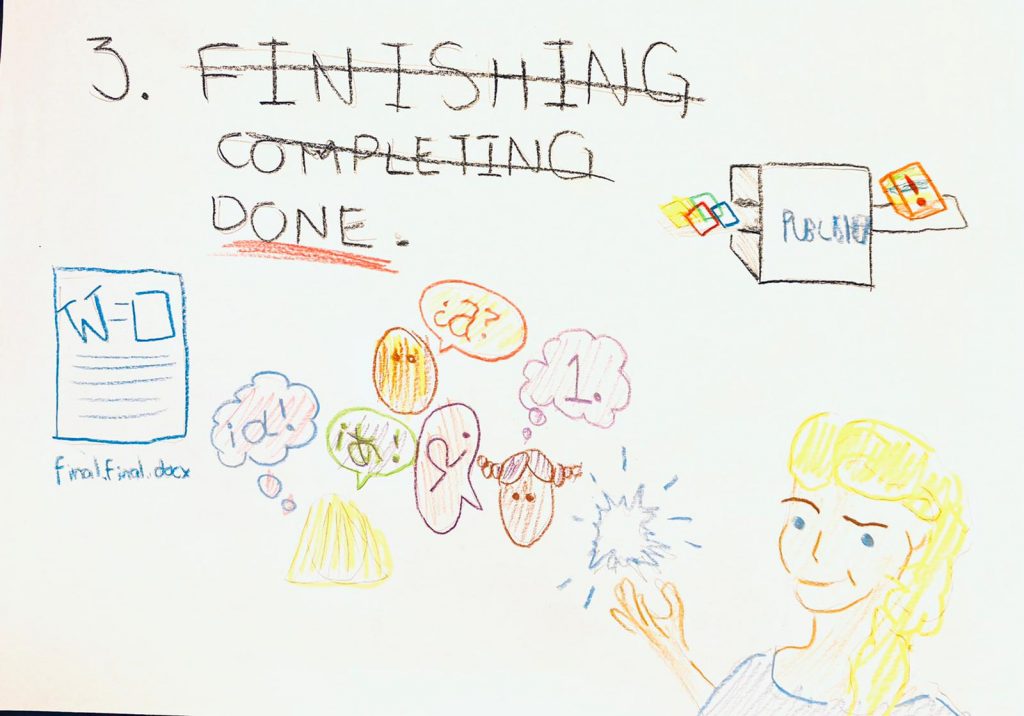
Finally, there is completing. I think this is one of the hardest parts of writing, as there is always “something” to be done with a story.
But as Elsa said it in her ice castle, sometimes you have to Let it go. Let it gooooooooo.
Caaaan’t hoooold it baaack noo mooOOOooooOOOooreeeeeeeeee. So you just have to stop at some point.
Having an editor in these cases helps, but as a self-publishing writer (and wanting to spend the least amount of money possible), I just exchange the favour with friends by offering food in exchange for reading books. And so, I just had “soft feedback”, even though in the end it could have been better to just have someone say “Orlando, no. Stop. That’s it”.
To that extent, I just kept re-writing the same paragraph for a few weeks. And months. And then it was just unbearable to go over and over and OVER AGAIN through the same parts of the text that I was not content with… but at some point, I had to stop. Full stop.
On November last year, I said “end”, uploaded all the necessary files to the publisher’s website and got a fresh batch of books before Christmas. Yay!
So yes, that is how I wrote a book.
Shout-out to the nice publishing house I am publishing in at the moment:
I think they have the most flexible prices (and plenty of other resources for the more clingy-type of people who would rather have more of the process done for them), so I cannot recommend them enough!
Additionally, you can contact me with any questions (if any are open).
orlando [at] antenasalcielo.com
Attribution: All images by Orlando Torres
